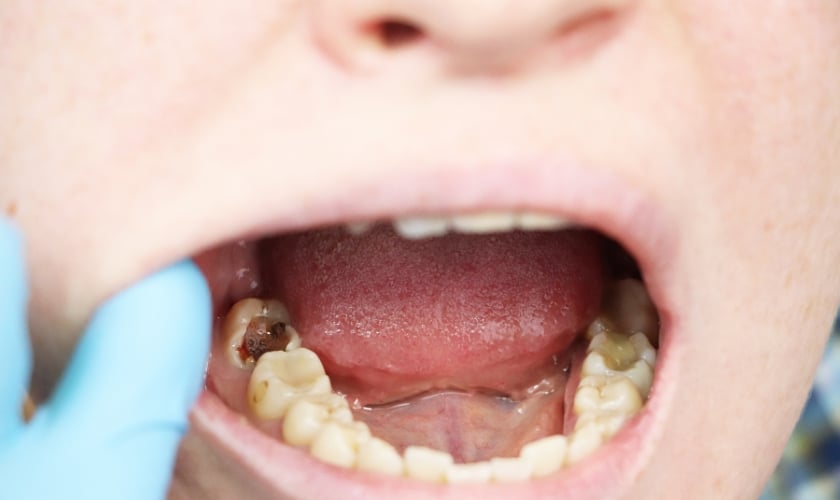10 Foods That Can Help Prevent Cavities
By :
Affordable Dentist | January 25, 2024
Maintaining optimal oral health goes beyond regular brushing and flossing; it extends to the food choices we make. Certain foods can act as natural defenders against cavities, promoting a radiant smile and robust oral hygiene. Let's delve into the details of each tooth-friendly delight:
Cheese
Cheese is more than just a delectable dairy product; it's a dental powerhouse. Rich in calcium and phosphorus, cheese aids in remineralizing enamel – the protective outer layer of your teeth. This remineralization process makes the enamel more resistant to acids that contribute to cavity formation. Additionally, the act of chewing cheese stimulates saliva production, which helps in maintaining a balanced pH level in the mouth.
Yogurt
Probiotics, the beneficial bacteria found in yogurt, play a crucial role in supporting a healthy oral microbiome. These probiotics help combat harmful bacteria in the mouth, reducing the risk of cavities and supporting gum health. Including yogurt in your diet regularly contributes to a microbial environment that promotes overall oral well-being.
Leafy Greens
Spinach, kale, and other leafy greens are packed with essential nutrients like calcium and folic acid. Calcium strengthens enamel, making it more resistant to decay, while folic acid promotes healthy gums. Incorporating these nutrient-rich greens into your meals provides a natural defense against cavities and contributes to overall oral health.
Apples
While apples contain natural sugars, their crisp texture and high water content make them tooth-friendly. Chewing apples stimulates saliva production, which helps neutralize acids in the mouth and rinse away food particles. The fibrous nature of apples also promotes gum health by acting as a natural toothbrush, removing plaque and debris.
Carrots
Raw carrots are not only a crunchy and satisfying snack but also beneficial for your oral health. Chewing carrots stimulates saliva flow, which assists in maintaining a clean mouth. Additionally, carrots are rich in vitamin A, a nutrient essential for gum health and overall oral well-being.
Almonds
Almonds are a nutrient-dense snack that benefits your teeth in multiple ways. High in calcium and low in sugar, almonds contribute to enamel remineralization while avoiding the detrimental effects of excessive sugar consumption. Chewing almonds can also help remove plaque and debris from the teeth, promoting a cleaner and healthier mouth.
Green Tea
Green tea is not only a soothing beverage but also a natural ally in the fight against cavities. It contains compounds that inhibit the growth of bacteria in the mouth, reducing the risk of cavities. Moreover, green tea helps lower acidity levels in saliva, creating an environment less conducive to the development of tooth decay. Its anti-inflammatory properties further support gum health.
Sugarless Gum
Chewing sugarless gum can be a fun and beneficial habit for your oral health. The act of chewing stimulates saliva flow, which helps neutralize acids and maintain a healthy balance in the mouth. Choosing gum with xylitol provides an additional advantage, as xylitol has been shown to inhibit the growth of cavity-causing bacteria.
Strawberries
Strawberries offer a natural burst of sweetness along with oral health benefits. Rich in antioxidants and vitamin C, strawberries help fight inflammation and strengthen gums. The malic acid present in strawberries also acts as a natural teeth-whitening agent. Including strawberries in your diet can contribute to both a radiant smile and robust gum health.
Salmon
Fatty fish like salmon are not only excellent for heart health but also beneficial for your teeth. Salmon is rich in vitamin D and omega-3 fatty acids, which play a crucial role in promoting strong teeth and reducing inflammation in the gums. Including fatty fish in your diet supports overall oral health and contributes to cavity prevention.
Incorporating these tooth-friendly foods into your diet can significantly contribute to preventing cavities and maintaining a healthy smile. However, it's essential to view these dietary changes as part of a holistic approach to oral care, which includes regular dental check-ups and consistent oral hygiene practices. While these foods provide valuable nutrients and protective benefits, minimizing the consumption of sugary snacks and beverages remains crucial for optimal oral health. Additionally, consulting with dental professionals can offer personalized advice tailored to your unique needs, ensuring a dazzling smile and a cavity-free mouth for years to come.


